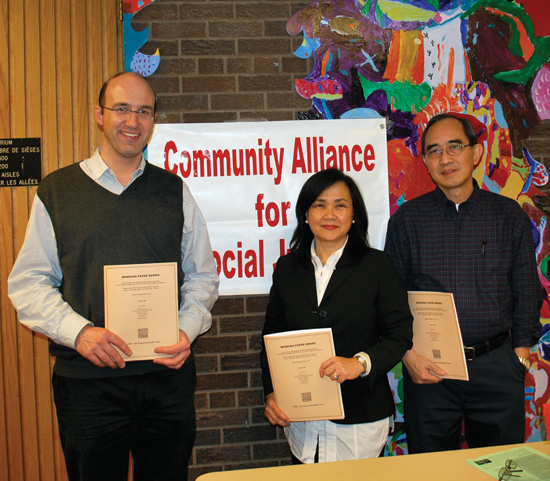What has changed since the 2009 study?
What has changed since the 2009 study?

STUDY LAUNCH. Authors of the study Deprofessionalized Filipino: Why Filipino Immigrants Get Low-paying Jobs in Toronto. From left: Philip Kelly, Mila Astorga-Garcia and Enrico Esguerra, at the launch on Oct. 29, 2009 at OISE auditorium, Toronto.
SPECIAL REPORT: DEPROFESSIONALIZATION OF IMMIGRANTS
By The Philippine Reporter Special Report Team
Mila Astorga-Garcia (Editor); Writers: Veronica Silva Cusi, Lea Luciano, Michelle Chermaine Ramos, Irish Mae Silvestre, Althea Manasan
It has been 12 years since the publication of the landmark study that had first looked into the impact of credentialization of trades and professions in the Filipino community in Canada.
The study revealed, among other things, how non-recognition of Philippine education, skills and work experience resulted in Filipinos occupying lower-level and less paying jobs than what they deserved, based on their credentials.
The study, titled Explaining the Deprofessionalized Filipino: Why Filipino Immigrants Get Low-paying Jobs in Toronto, published in October 2009 by the prestigious CERIS (Centre of Excellence for Research on Immigration and Settlement) – The Ontario Metropolis Centre, is co-authored by Philip F. Kelly, Mila Astorga-Garcia, Enrico Esguerra, and the Community Alliance for Social Justice (CASJ).
Starting this issue, The Philippine Reporter will report what has changed through the years since the study, by looking into some government and credentialing bodies’ current policies and practices; observations and opinions of academics and researchers; advocacy efforts of institutions, professional associations, and community-based organizations; and the actual experiences of people impacted by the credentialization issue.
Readers of The Philippine Reporter are invited to share their own experiences brought about by the non-recognition of education and skills earned in the Philippines, their opinions on why this issue has persisted through the years, and their suggestions for solutions on this matter. For contributions, please contact philreporter@gmail.com. (MAG)
In this Special Report:
Comments (0)